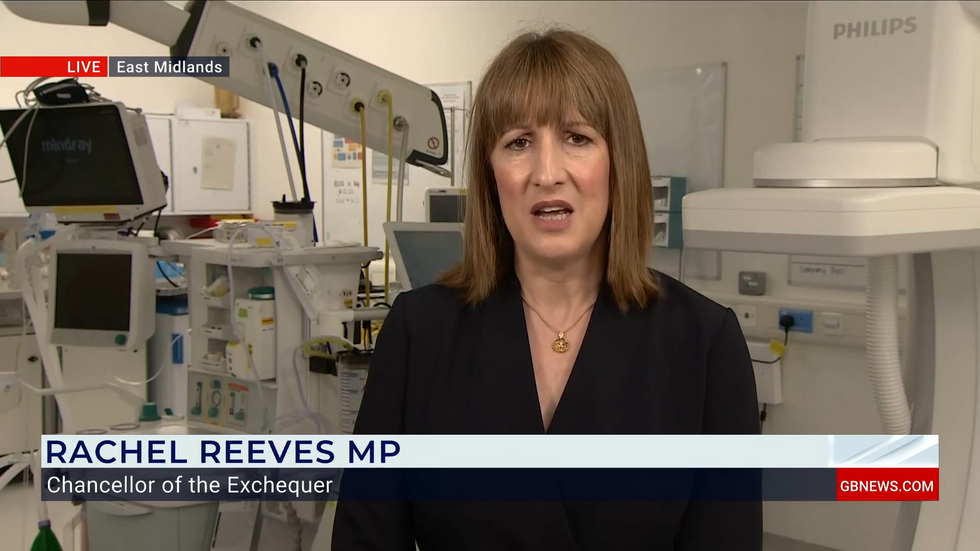Rachel Reeves could target pensions in 'increasingly desperate' tax raid as Budget looms
Analysts are sounding the alarm that Chancellor Rachel Reeves could target pensions in an "increasingly desperate" tax raid in the upcoming Budget this October.Figures from HM Revenue and Customs (HMRC)reveal that pension tax and National Insurance relief reached £52.5billion during the 2023/24 financial year, marking a slight increase from £50.1billion in the previous period.The publication of these statistics has intensified speculation that the Chancellor might raid pension savings in her upcoming Budget as she grapples with significant fiscal constraints.Industry experts warn that the substantial figure could make pensions appear an attractive revenue source for a Treasury seeking billions to satisfy stringent borrowing commitments.Tom Selby, the director of public policy at AJ Bell, cautioned that Reeves finds herself in "an ever-tightening fiscal straitjacket" and faces "an increasingly desperate scrabble" to identify the substantial funds required to fulfil her "cast-iron" fiscal rules.National Insurance relief on employer contributions accounts for approximately one-third of the total gross cost, meaning businesses rather than individual savers are the primary beneficiaries of this portion.Employee tax relief for the 2023/24 period included £6.2 billion related to 'net pay' arrangements, predominantly covering public sector defined benefit scheme contributions.An additional £7.2billion was attributed to salary sacrifice pension arrangements used by employees. By comparison, 'relief at source' schemes accounted for £4.4billion of the total.Do you have a money story you’d like to share? Get in touch by emailing money@gbnews.uk.Any proposal to implement a flat rate of pension tax relief below 40 per cent would create significant administrative challenges, particularly for public sector defined benefit schemes.Higher-rate taxpayers contributing to net pay arrangements would face new tax charges to reduce their automatic relief from 40 per cent to the proposed flat rate.For instance, if the Government introduced a 30 per cent flat rate, a higher-rate taxpayer making a £10,000 contribution to a net pay scheme would need to pay an additional £1,000 tax charge.This would affect all workers earning above £50,270 who save into pensions, including doctors and other public sector professionals who have previously protested over pension taxation issues. Experts note that such changes could also threaten the future of salary sacrifice arrangements, which currently provide valuable benefits to millions of workers. Implementing a more severe reduction to a 20 per cent flat rate would raise serious questions about fairness between generations.Younger employees, who typically receive less generous workplace pension benefits than previous generations, would lose the opportunity to benefit from higher-rate relief as their careers advance.LATEST DEVELOPMENTS:Labour's 'double whammy' death tax raid slammed as Rachel Reeves prepares to slash reliefPension WIN as Britons avoid tax raid on retirement savings - how to claim £4k refund from HMRCPensioners could be owed £4,000 each as HMRC tax refund claims surge past 500,000 - check nowTom Selby highlighted that "any move which potentially deters people from contributing to pensions would also run counter to wider efforts to boost long-term investing." The ongoing uncertainty surrounding pension taxation has prompted calls for government intervention to protect savers. Selby advocates for a "Pensions Tax Lock" that would guarantee no changes to tax relief or tax-free cash allowances for the remainder of this Parliament.He argues that "constant rumour and speculation about pension tax relief and tax-free cash is destabilising for long-term savers".

Analysts are sounding the alarm that Chancellor Rachel Reeves could target pensions in an "increasingly desperate" tax raid in the upcoming Budget this October.
Figures from HM Revenue and Customs (HMRC)reveal that pension tax and National Insurance relief reached £52.5billion during the 2023/24 financial year, marking a slight increase from £50.1billion in the previous period.
The publication of these statistics has intensified speculation that the Chancellor might raid pension savings in her upcoming Budget as she grapples with significant fiscal constraints.
Industry experts warn that the substantial figure could make pensions appear an attractive revenue source for a Treasury seeking billions to satisfy stringent borrowing commitments.

Tom Selby, the director of public policy at AJ Bell, cautioned that Reeves finds herself in "an ever-tightening fiscal straitjacket" and faces "an increasingly desperate scrabble" to identify the substantial funds required to fulfil her "cast-iron" fiscal rules.
National Insurance relief on employer contributions accounts for approximately one-third of the total gross cost, meaning businesses rather than individual savers are the primary beneficiaries of this portion.
Employee tax relief for the 2023/24 period included £6.2 billion related to 'net pay' arrangements, predominantly covering public sector defined benefit scheme contributions.
An additional £7.2billion was attributed to salary sacrifice pension arrangements used by employees. By comparison, 'relief at source' schemes accounted for £4.4billion of the total.
Do you have a money story you’d like to share? Get in touch by emailing money@gbnews.uk.

Any proposal to implement a flat rate of pension tax relief below 40 per cent would create significant administrative challenges, particularly for public sector defined benefit schemes.
Higher-rate taxpayers contributing to net pay arrangements would face new tax charges to reduce their automatic relief from 40 per cent to the proposed flat rate.
For instance, if the Government introduced a 30 per cent flat rate, a higher-rate taxpayer making a £10,000 contribution to a net pay scheme would need to pay an additional £1,000 tax charge.
This would affect all workers earning above £50,270 who save into pensions, including doctors and other public sector professionals who have previously protested over pension taxation issues.
Experts note that such changes could also threaten the future of salary sacrifice arrangements, which currently provide valuable benefits to millions of workers. Implementing a more severe reduction to a 20 per cent flat rate would raise serious questions about fairness between generations.
Younger employees, who typically receive less generous workplace pension benefits than previous generations, would lose the opportunity to benefit from higher-rate relief as their careers advance.
LATEST DEVELOPMENTS:
- Labour's 'double whammy' death tax raid slammed as Rachel Reeves prepares to slash relief
- Pension WIN as Britons avoid tax raid on retirement savings - how to claim £4k refund from HMRC
- Pensioners could be owed £4,000 each as HMRC tax refund claims surge past 500,000 - check now

Tom Selby highlighted that "any move which potentially deters people from contributing to pensions would also run counter to wider efforts to boost long-term investing."
The ongoing uncertainty surrounding pension taxation has prompted calls for government intervention to protect savers.
Selby advocates for a "Pensions Tax Lock" that would guarantee no changes to tax relief or tax-free cash allowances for the remainder of this Parliament.
He argues that "constant rumour and speculation about pension tax relief and tax-free cash is destabilising for long-term savers".







































